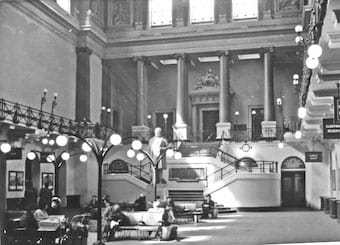THERE were trains for freight, mail and passengers, including plush first class carriages for six, and even ‘bed-carriages’, the first sleeper trains; one’s brougham or landau could also be loaded onto a flat waggon.* Second class carriages seated eight, but third class carriages had no roof, and were liable to be coupled next to a cattle truck.
Two magnificent terminal stations were designed by Philip Hardwick in the Greek classical style, one at Curzon Street in Birmingham and another at Euston in London, where in 1849 a Great Hall was added, with eight allegorical statues representing cities along the route, and one of George Stephenson.
The Curzon Street entrance still stands, though the station was superseded by New Street in 1854. Hardwick’s Euston, with its spacious hall, tall Doric arch and elegant wrought-iron trainshed roof, was wantonly destroyed in 1962, entirely in the name of ‘progress’.
In 1946, the London and Birmingham Railway merged with its northern neighbours to form the London and North Western Railway.
Two kinds of gentleman’s horse-drawn road carriage. The first English-built landaus appeared in the 1830s, and Lord Brougham placed his first orders with London coachbuilder Robinson & Cook just about the time when the London & Birmingham opened to the public.
Précis
Although a magnificent station was built at each end of the railway, the one in Birmingham was used only briefly, and the other at Euston in London was demolished in 1962. However, the line remains the first to introduce sleeper carriages, and it also carried private road vehicles much like today’s Channel Tunnel trains. (54 / 60 words)
Although a magnificent station was built at each end of the railway, the one in Birmingham was used only briefly, and the other at Euston in London was demolished in 1962. However, the line remains the first to introduce sleeper carriages, and it also carried private road vehicles much like today’s Channel Tunnel trains.
Edit | Reset
Variations: 1.increase the length of this precis to exactly 60 words. 2.reduce the length of this precis to exactly 50 words. 3.introduce one of the following words into the precis: about, because, besides, despite, not, ought, unless, until.
Archive
Find this and neighbouring posts in The Archive
Find this post and others dated 1838 in The Tale of Years
Tags: Discovery and Invention (117) History (957) British History (494) Victorian Era (138) London and Birmingham Railway (2) Railways (37) George Stephenson (18)
Word Games
Sevens Based on this passage
Suggest answers to this question. See if you can limit one answer to exactly seven words.
Why would third class passengers hope for a fine day?
Suggestion
Because their railway carriages had no roof. (7 words)
Variations: 1.expand your answer to exactly fourteen words. 2.expand your answer further, to exactly twenty-one words. 3.include one of the following words in your answer: if, but, despite, because, (al)though, unless.
Jigsaws Based on this passage
Express the ideas below in a single sentence, using different words as much as possible. Do not be satisfied with the first answer you think of; think of several, and choose the best.
Mail trains ran at night. These trains had carriages with beds. They were for first class passengers.
Spinners Find in Think and Speak
For each group of words, compose a sentence that uses all three. You can use any form of the word: for example, cat → cats, go → went, or quick → quickly, though neigh → neighbour is stretching it a bit.
This exercise uses words found in the accompanying passage.
1 Parliamentary. Steep. Third.
2 Flat. Liable. There.
3 City. Fire. Half.
Variations: 1. include direct and indirect speech 2. include one or more of these words: although, because, despite, either/or, if, unless, until, when, whether, which, who 3. use negatives (not, isn’t, neither/nor, never, nobody etc.)
Add Vowels Find in Think and Speak
Make words by adding vowels to each group of consonants below. You may add as many vowels as you like before, between or after the consonants, but you may not add any consonants or change the order of those you have been given. See if you can beat our target of common words.
pttd (6)
See Words
aptitude. patted. petted. pitted. potted. putted.
Post Box : Ask Nicholas
Grok : Ask Grok
You are welcome to share your creativity with me, or ask for help with any of the exercises on Clay Lane. Write to me at this address:
See more at Post Box.
If you like what I’m doing here on Clay Lane, from time to time you could buy me a coffee.
Buy Me a Coffee is a crowdfunding website, used by over a million people. It is designed to help content creators like me make a living from their work. ‘Buy Me a Coffee’ prides itself on its security, and there is no need to register.






